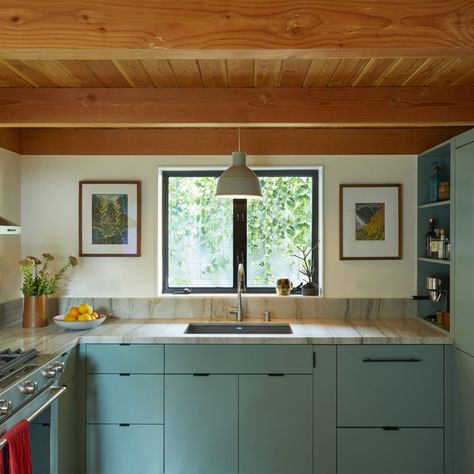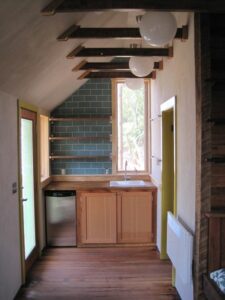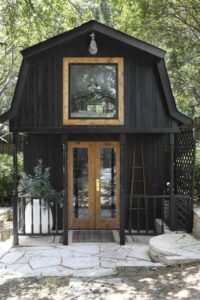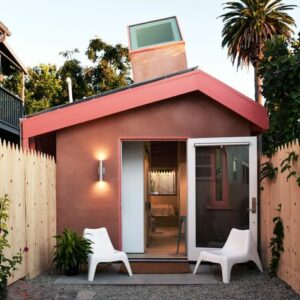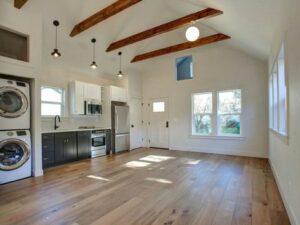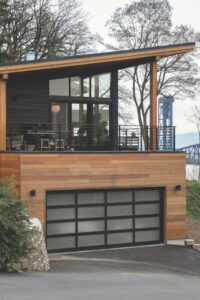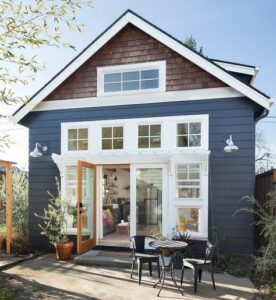Photo Credit: Urbanology Designs, https://www.urbanologydesigns.com/
ADUs are a hot topic because we’re rethinking the way we live.
If you’re considering buying a home with an ADU or one that has potential for adding/improving an existing ADU, or creating one for your existing property, read on. Maybe you like the idea of offsetting that mortgage with a bit of rental income? Not only do conforming loan guidelines now allow buyers to use rental income to qualify for homes with ADU’s, there are more reasons to get educated on ADUs than you can shake a stick at. My hope is to provide you with a concise and usable guide to the latest in modular building (ADU’s, Income Units, etc.)
Why, and who’s doing this? ADUs can build wealth, create in-fill housing, reduce displacement, and enhance neighborhood resilience. People are building ADUs on their property to:– Expand living space for the family or extended family (ie. a place for a parent to live so they can be nearby but not living in the room next door, or a place for the grown child to return to after college without having to be right on top of each other).
– Downsize to a smaller living space without giving up your property rights.
– Have an office or studio workspace easily accessible and close to home.
– Offset or pay for mortgage. Some owners opt to remain in the house and use rental income from the ADU to help offset mortgage while others choose to move into the ADU and let the renter pay for most of or even the entire mortgage.
What is an ADU?
The term ADU stands for Accessory Dwelling Unit. ADUs are secondary homes built on a single family residential lot. It can be tricky to understand the differences between tiny houses, granny flats, and backyard cottages–and that’s simply because all of those structures can serve as an ADU, whose purpose is what defines it. What an ADU provides is a flexible living arrangement that can extend the value of a home, and the purpose of it is to serve as a complete residence, everything you need to live, basically: to-code places to sleep, cook, and bathe.
Ways to ADU:
ADUs can be many forms: detached garage, basement conversion, prefab unit — an addition to an existing home, or even a detached addition to a primary residence.
So let’s first consider: for what use? Multi-gen use for housing family? Use it as a place for in-laws or college-age kids to stay? Or creating a space to house the occasional guest? Whether creating or buying existing, having additional office or studio space that could be converted to a short term or year lease to provide rental income later — is a very good idea, and there are tons of ways to approach it.
All this factors on your goals, of course. Do you want more internal space (i.e. basement use) or do you want more yard space? Rental income? Downsize and live permanently in the ADU and rent out the main house?
There are other types of Detached Accessory Structures: Guest Suites or Home Studios, for example and though they look and feel like ADUs, they are easier and faster to build and permit. The key difference is they can only have one sink. So let’s keep this discussion to simply ADUs.
What are the rules?
A detached ADU cannot exceed 20 feet in height. Coverage of the ADU can’t exceed that of the primary residence. The ADU is not permitted to occupy more than 15% of the site’s total area. The unit must either be set back 40 feet from the front of the lot line or behind the rear wall of the main residence.
In Portland, an Accessory Dwelling Unit is defined, technically, as “any smaller, secondary dwelling unit which can be legally added either on the same lot or within a house, attached house or manufactured home in residential zones”. Legally, an ADU is part of the same property as the main home. It’s not (typically) bought or sold separately.
Permitting and What To Expect, Depending On Use:
For long term rentals, Portland currently has a program that waives the extensive building permits associated with building some ADUs. Portland has some clauses that help with building ADUs for long-term rentals as well.
That said, as far as Short Term rentals (STRs), most homeowners go the Airbnb route. Portland is among the stricter cities when it comes to short-term Airbnb rules and regulations.
But for all ADU structures, you’ll need to get a permit from Portland’s Central Planning Bureau, which can honestly be a bit of a pain. You’ll also need to get the permit approved by Portland City Council and then you’ll usually need approval from the Zoning Administrator as well. The process can take days or months, depending on how busy they are.
Most proper1es in Portland are able to accommodate an ADU. Please note that there are requirements for open space – you’ll need to leave an area that is 250 sqH and 12’ x 12’ minimum and you can’t have it in the front yard. Tree protec1on and setbacks also influence where your ADU can be placed. Additionally your ADU must be at least 40’ behind the front property line or behind the rear wall of the exis1ng house. So, best to get some help. But who? Finding the intersection of affordability with quality and sustainability is key in hiring your project partners. Who to start a conversation with for Design/Build? Or maybe look into prefab units like those offered by Cover?
Design & Build? Or maybe just fix up/convert? Consider a consultation with The Portland area best:
- Mark Allen with Peg Construction
- SQFT Studios
- Living Room Realty FIXERS – Maybe your space is ready to go outside of some repairs/renovations – maybe just need to add an egress or little kitchen area? LRR Fixer crew are masters.
What style? Here’s some of the usual suspects:
- Apartment over garage
- Garage conversion
- Back yard cottage
- Granny flats
- Mother in law quarters
- Prefab detached unit
Investment: Ballpark costs to build
For a detached Portland ADU new build, all in with permits and build is roughly $150 a square foot (builders general cost), or assuming about 200-250k minimum from scratch; 150K for a minimum viable type deal for a smaller budget.
Figure out financing – there are tons of options, and Portland’s got some of the sharpest loan professionals around who specialize in ADU and can customize your loan options accordingly. Check out the ones we love the most, and their favorite products:
- James Adair, Neo Loans
- Craft3 Loans Craft3 is enthusiastic about the many benefits of ADUs. They offer hard-to-find financing, with two affordable and convenient ADU loans, providing options for investing in your property and your community. Both loans are available in Multnomah, Washington, and Clackamas Counties, Oregon.
- Your existing resource – credit union, lender you’re working with, or just simply have a conversation with me – I’m no lender, but I specialize in connecting the right people to find the perfect match in products and expertise.
Return: Estimating the ROI on your proposed ADU project. How much money can this generate monthly?
ADUs are an ideal source of passive income, and they keep getting more lucrative. A detached ADU adds the most value to your property; next in value is an ADU attached to the main house.
An ADU converted from existing space within the primary house, like a master bedroom suite, attic, or basement, adds the least value to your property, but it still adds value.
Let’s look at how an ADU can generate passive income, save you money, increase your personal options, and maximize your property’s value both now and in the future.
To get a sense of the income an ADU in your area could generate, research local rents on rentcafe, craigslist, AirBNB, or vrbo. ADUs offer more privacy than apartments, and many have their own outdoor areas, which makes them more appealing to a lot of tenants.
And finally, ask yourself – do you need professional property management services or go it on your own?
Maybe just a conversation with someone who’s doing this now? It’s exciting to hear both the ups and downs. Or maybe you’re thinking you might want to sell your current place or rent it out? Find an ADU of your own? I’d love to talk to you about all aspects of this, so give me a call, I’ve got experience on all sides of this fascinating, very sweet way of living now, being creative and practical. Looking forward to hearing from you!
